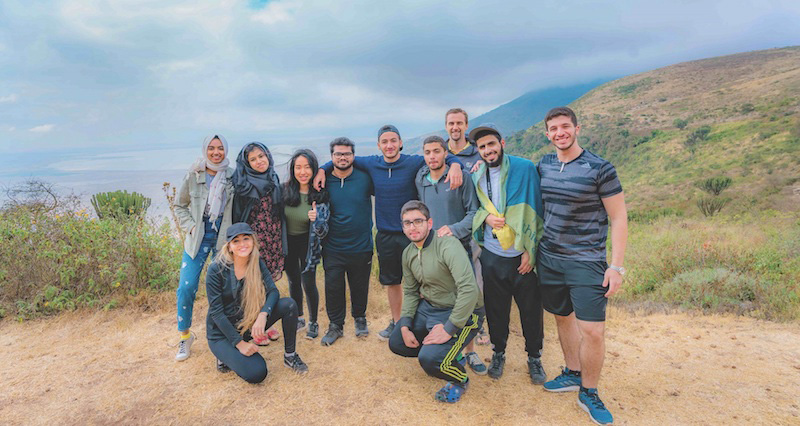WCM-Q Professor Recounts Tanzanian Journey with Book of Stories, Photographs
The life-changing experiences of ten medical students on a service learning trip to Tanzania can now be read and shared in a book compiled by Weill Cornell Medicine-Qatar (WCM-Q) Professor Dr Dietrich Büsselberg.
 The 154-page book, entitled Experiencing Tanzania: Reflections of a Medical Service Learning Trip Through the Eyes of Aspiring Physicians, features articles by students recounting their impressions of the east African country, its people, wildlife and awe-inspiring landscapes, and the challenges of providing healthcare in a low-resource setting.
The 154-page book, entitled Experiencing Tanzania: Reflections of a Medical Service Learning Trip Through the Eyes of Aspiring Physicians, features articles by students recounting their impressions of the east African country, its people, wildlife and awe-inspiring landscapes, and the challenges of providing healthcare in a low-resource setting.
The book is illustrated with more than 300 photographs taken by Dr Büsselberg, also a keen amateur photographer, who accompanied the students on the ten-day trip. He captured the students as they toured the country, providing free health checks to local people, and at the same time taking in the spectacular scenery and the wealth of exotic animals in the country, such as lions, cheetahs, hippos, rhinos, crocodiles and elephants, among many others.
Dr Büsselberg, a professor of physiology and biophysics, said Tanzania is an extraordinary country of incredible natural beauty but low-income, where healthcare is often very difficult to access for majority of the population.
This contrast between natural beauty and hardship made for some profound experiences for the students, fundamentally altering their perception of what it means to be a doctor and a healer. I wanted to record those experiences for posterity and to inspire others, and these were the reasons for creating the book.’
 The service learning trip to Tanzania happened during the summer of 2018, supported by the WCM-Q Student Affairs Division. The group visited Arusha and Moshi in the northeast part of the country, and spent time interacting with local people in their homes, businesses, a local hospital, schools and an orphanage. They also visited three national parks: Tarangire National Park, Lake Manyara National Park and the Ngorongoro Conservation Area, home of the famed Ngorongoro Crater.
The service learning trip to Tanzania happened during the summer of 2018, supported by the WCM-Q Student Affairs Division. The group visited Arusha and Moshi in the northeast part of the country, and spent time interacting with local people in their homes, businesses, a local hospital, schools and an orphanage. They also visited three national parks: Tarangire National Park, Lake Manyara National Park and the Ngorongoro Conservation Area, home of the famed Ngorongoro Crater.
The articles, written by students and local professionals, explain the social, economic and cultural context of Tanzania, the difference between urban and rural lifestyles, the lives of the Maasai people, the system of national parks and their role in protecting the flora and fauna of the country, the scourge of poaching, and the major public health challenges facing the country. With a GDP of US$900 per capita, Tanzania struggles to provide basic healthcare to its people.
The book was published and printed in Doha and is hosted online at the HBKU Press academic platform, QScience.com. Check the link to read the online version of the book.





